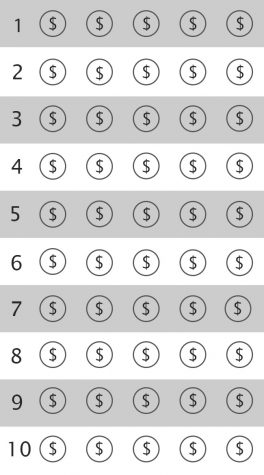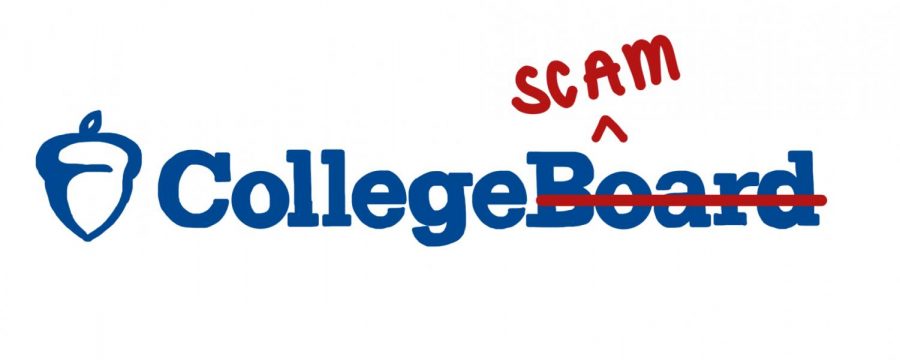The College Board is a Scam
It’s the College Board’s world; we just happen to live in it. High schoolers would be hard-pressed to make it through the college application process without taking at least one test administered by the not-for-profit organization, which controls the SAT, the PSAT and the AP exams Many students take three or more AP tests, at $110-150 each, along with SATs at $52 apiece — plus additional fees for sending scores to each individual college. Fee waivers are available only to those who receive free or reduced lunch, or other federal financial assistance. The College Board is inescapable, and they turn a large profit.
86% of Tatler poll respondents think that the College Board is a scam. I agree. “Scam” is nebulous and a bit dramatic, but it’s accurate: the organization dominates its market and takes advantage of that to provide mediocre service, charge exorbitant fees and get away with questionable practices.
By default, every sophomore and junior takes the PSAT (in a non-pandemic year). On the answer sheet, they’re presented with a seemingly innocuous question: are they interested in the Student Search Service? And if so, could they please bubble in pages and pages of information, from parental educational attainment to race to ZIP code to GPA? The SSS claims to connect high schoolers with colleges suited to their interests and academic abilities, but most students find themselves buried in emails and brochures from unpopular schools looking to prop up their enrollment rates and willing to pay for it. The Washington Post estimates that schools pay 42 cents per name when buying student information from the College Board. Start multiplying—by all the colleges who need to advertise, by all the students across the country who take the PSAT — and College Board’s earnings get big quickly.
The ethical issues don’t end with the SSS. A Wall Street Journal investigation found that SAT test takers’ names go for even more — 47 cents apiece — and that the College Board sells them not only to schools looking for future students but to selective schools who advertise to unqualified students. By recruiting then rejecting these applicants, colleges lower their acceptance rates and raise their desirability and national rankings; by selling to them, the College Board worsens an already toxic and hypercompetitive admissions process.
Even a student who doesn’t join the SSS and takes the ACT instead of the SAT could still find their information abused. The College Board is part of the Student Privacy Pledge, an agreement between education companies that they won’t use student web traffic for targeted advertising, but a 2020 Consumer Reports investigation found that their website used services that share user information with companies like Google and Facebook. The Consumer Reports reporters who made fake College Board accounts to monitor cookie traffic found themselves with student-targeting ads for Grammarly and financial planning services. Such information use is commonplace on the internet and not generally considered unethical, but since it targets teenagers (who are more impressionable than adults) and is explicitly against the College Board’s privacy policy, it’s part of the organizations’ pattern of poor practice.
The College Board’s AP exams also cause controversy. The College Board is the only organization to offer the tests, which are supposed to help students save money on college by placing them out of freshmen-level courses. As such, the College Board gets to charge whatever they want for the exams, and they’re expensive. For the three AP tests I plan to take in the spring, I paid $450. When the COVID-19 pandemic pushed the tests online and some students found themselves plagued by connection issues or unable to submit their answers (College Board did provide them with a test make-up day), there was a common complaint: we paid that much for this?
The problem is that the College Board has no competition. Students can take the ACT instead of the SAT, but the College Board is the only organization offering AP exams and other specialized tests like the Character Skills Snapshot (which Lakeside required for a time). Thus, they can name their price, and students have to pay.

The College Board has done one thing right: this year, they eliminated subject SAT tests and the SAT essay, arguably the scammiest parts of the scam. The subject tests were becoming obsolete, an extra fee and studying burden that is redundant with AP exams. Since the New York Times reported in 2005 that length on the SAT essay was almost directly correlated with eventual score — longer is better — it had also fallen out of favor, and was required by few colleges before its elimination.
These recent changes are a bellwether for a larger shift in college admissions. Many schools are test-optional now, recognizing both the logistical challenge of taking a test during a pandemic and the equity issues inherent in an admissions tool that rewards expensive test-prep courses and private tutors. The SAT and other tests were supposed to level the playing field, giving all students an equal opportunity to prove their merit, but they only exacerbate inequality in the college process.
Suddenly, the College Board looks like just a piece of a larger problem. Sure, they squeeze every dollar they can out of their test-takers, but they wouldn’t exist without a system that looks to standardized tests as a fair way to assess student ability (they’re not). Admission testing’s fall from grace may prompt mixed emotions from high-scoring Lakesiders, but for opponents of the College Board, it’s an overdue change.


Dr Robert C Brooks | Oct 31, 2021 at 11:54 am
Very nice article. My girlfriend’s daughter just took the PSAT and filled in the “are you interested” bubble.
College Board’s email made it sound like her daughter had specifically requested that info about College Board be sent to her mom. And at one point in the email, it indicated that her daughter had specifically signed up for College Board.
Thank you for this very nice, and certainly enlightening, article.
R. Brooks
Charleston, South Carolina